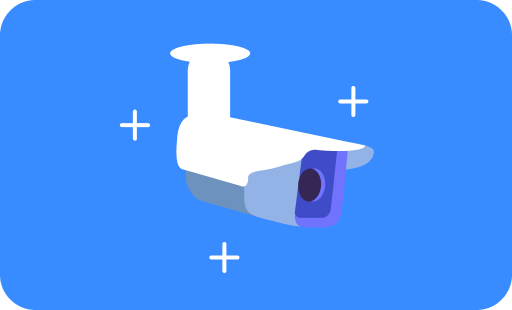5 things you need to know about cloud technology | Blog | Calipsa
- Physical security

Thanks to cloud-based services, we are more connected than ever. Music, video chats and email are all available to us at the click of a button - but how exactly does cloud technology work? We break down the 5 key things security experts need to know.
Want to know more about our cloud-based False Alarm Filtering Platform? Check out all our latest product features and services here.
Cloud computing is much simpler than it sounds
What is the cloud, and how does it work? Put simply, “the cloud” is a term to describe servers that are accessed over the internet. It also refers to the software and databases that run on these servers.
Most of the online services we use every day are “cloud” services, because we access them over an internet connection rather than on our devices. From checking your Gmail to streaming on Netflix - all of these are services that couldn’t exist without the cloud.
For example, you can start streaming a film on your TV, then pick up where you left off on your phone, then carry on watching on your laptop, because each time you are remotely connecting to the server(s) where the film is stored.
Even though we talk about “the cloud”, there isn’t one “cloud” where everything is stored. Many different companies provide “cloud systems”; remote access and storage through their network of servers, which are located in data centres around the world. Major players include Google, Amazon and Apple.
Cloud technology offers high security and value for money
With all this remote access, is it safe to use the cloud? On the whole, yes; cloud technology provides some of the most reliable and secure systems out there. This is ideal for small businesses who don’t have the budget or resources to invest in costly IT infrastructure and security.
Cloud systems offer many high-spec advantages for a relatively low cost. Firstly, companies have access to much more data storage than they could afford to store on local servers. As cloud systems operate through multiple, powerful remote servers, businesses can scale their data storage up or down depending on their needs.
This brings us to data security. Cloud technology uses encryption to secure the data stored and transferred on its servers. Encryption uses complex algorithms to conceal information, making it very difficult to hack, or “decrypt”.
It is worth mentioning that recent cloud hacking cases in the news are, on closer inspection, in fact data security breaches and not decryption. High-profile stories such as Apple’s iCloud hack and Dropbox’s data breach involved phishing, and obtaining users’ emails and passwords.
Although technically possible, decryption is extremely difficult, time-consuming and expensive to do, which is why most hackers attempt to access people’s accounts by other means. Cloud users should be vigilant about their password security, to ensure their login details remain difficult to breach.
Another benefit of the cloud for businesses is built-in data backup, known in the industry as redundant systems. This is where cloud providers will duplicate copies of your data, systems and equipment, so that if the worst happens and your cloud service is corrupted or it goes down, you still have immediate access to backed-up versions of everything you store and use online.
Finally, all the main cloud providers have numerous security partners to keep all the different aspects of an IT system running safely and smoothly; for example, firewalls, antivirus, encryption, host and endpoint protection, and access controls, to name just a few.
So overall, cloud systems are a very reliable and secure way to share and store information. As with any system, it isn’t foolproof, but there is plenty of technology in place to keep information backed up and safe from prying eyes.
Cutting-edge technology is often cloud-based
Just as many of the services we know and love run in the cloud, so does the latest technology. New developments in artificial intelligence (AI) and machine learning are now happening even faster than before.
Basing AI and machine learning development in the cloud has numerous advantages. You need vast amounts of data to train a computer to learn complex tasks or identify patterns, so the cloud allows data scientists to easily store and access huge datasets.
Large datasets require special equipment. Graphics processing units (GPUs) are used to speed up computations and to give the computer scope to do multiple tasks at once. When you add cloud systems into the mix, it can dramatically reduce the time it takes to experiment and test a machine learning model.
As well as speeding up the pace of new features and improvements, the cloud also allows technology companies to roll out these updates without users needing to install anything. For example, with music and video streaming services this means that new content can be released all the time; to access it, all the end user needs to do is log in.
For software like Calipsa’s False Alarm Filtering Platform, it means that we can regularly deploy updates without disturbing the activity on our customers’ individual dashboards, so service can continue as seamlessly as possible.
Cloud systems will be a game-changer for the security industry
For all the reasons above, cloud technology spells a new and exciting time ahead for the security industry. With scalable services and out-of-the-box security, new businesses can enter the industry without the pressure of upfront capital expenditure on hardware and proprietary software systems. All of this is taken care of by the cloud provider.
Many established security companies are now expanding their services to offer clients technology-based services in addition to traditional physical security services, and the cloud makes this move much more accessible for smaller, independent firms.
By transitioning from manned guarding to digital security, many security businesses now have a sustainable future ahead of them. Services such as object tracking and intelligent video analytics allow companies to move into areas such as video surveillance, to supplement their on-the-ground manned guarding and use guards more effectively.
The speed and efficiency of cloud technology can also help businesses to maintain their service level agreements with their customers. No matter where they are, with cloud solutions customers can get real-time updates on multiple sites over a secure internet connection - something that would be time-consuming and difficult for a human operator to consistently achieve.
Cloud technology is the future of video monitoring
Video monitoring has already come on leaps and bounds thanks to cloud technology, for two key reasons. Firstly, cloud systems make surveillance cameras more useful than ever before. As well as being able to view multiple camera feeds in real time, the cloud also presents security firms with a much more secure way to store footage.
Remote servers provide a cost-effective way to store vast amounts of video footage, which takes up a great deal of space on a hard drive. Rather than being forced to delete footage to make more space, firms can now purchase more storage space if it’s needed. What’s more, storing footage remotely also greatly reduces the risk of it being lost, damaged or tampered with; this is particularly important if firms are investigating a filmed security incident.
The second reason the cloud is so vital to the future of video monitoring is that without it, we wouldn’t already have such sophisticated video analytics; this includes AI and machine learning-based software like Calipsa’s False Alarm Filtering Platform.
Being able to store so much footage online means that data engineers have large datasets to work with, as well as the platform to test machine learning models effectively. At Calipsa, we’re continuing to test and improve our technology in the cloud, so that our customers have an easy and effective way to make their sites safer - one camera at a time.
Calipsa’s cloud-based False Alarm Filtering Platform is a fast, intuitive way to make your video monitoring services more effective. See it in action with a 1-month free trial.







No comments